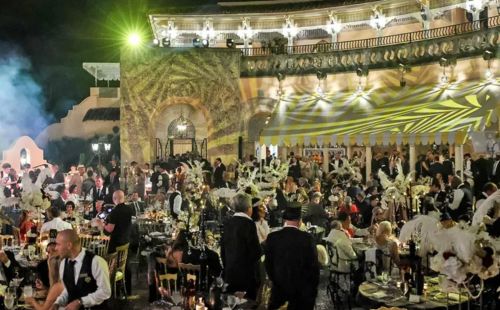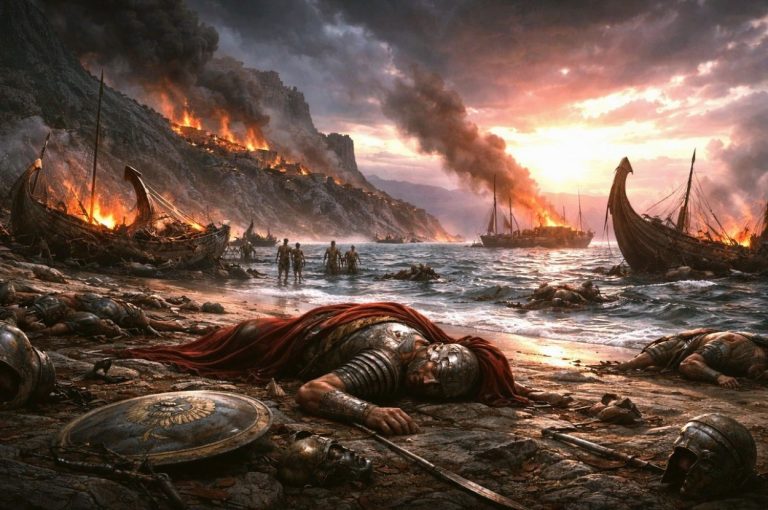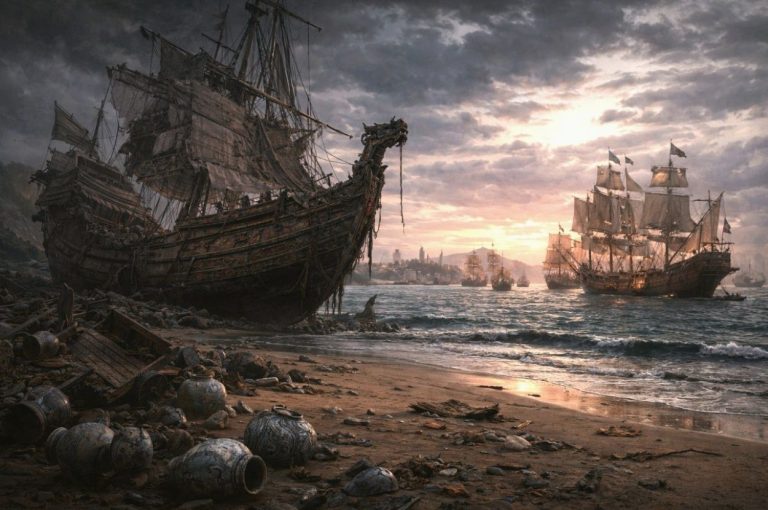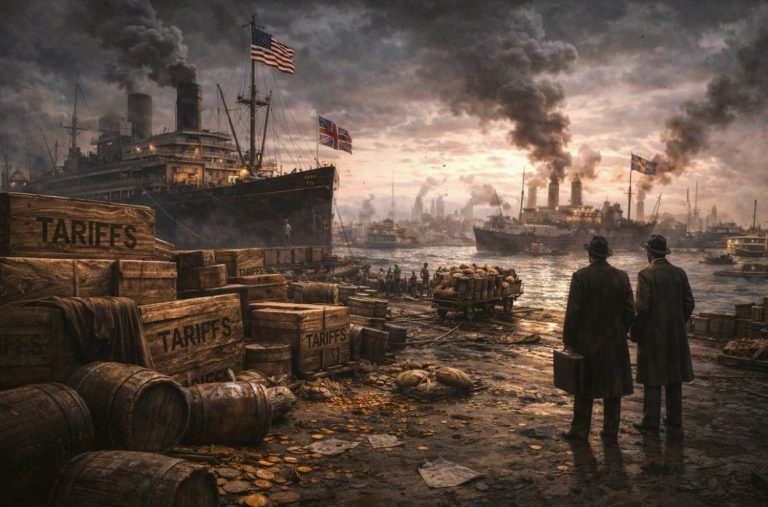

America is borne back ceaselessly not to the past, but to the same unlearned lesson: that wealth without compassion is not triumph, but tragedy.

By Matthew A. McIntosh
Public Historian
Brewminate
Introduction
The scene could have been lifted straight from F. Scott Fitzgerald’s pages: gilded halls, champagne glasses clinking beneath chandeliers, guests draped in sequins and feathers as a jazz band played into the night. But this was not West Egg in 1925, it was Mar-a-Lago in 2025. On October 31, while millions of Americans faced food insecurity and an ongoing government shutdown, President Donald Trump hosted a “Great Gatsby”-themed Halloween party celebrating excess and opulence, a tone-deaf display that seemed almost designed to parody itself. The soirée took place just hours before millions risked losing access to Supplemental Nutrition Assistance Program (SNAP) benefits due to the shutdown.
The symbolism was almost too sharp to be accidental. The Great Gatsby is, after all, a critique of wealth as illusion, a portrait of people who mistake glitter for meaning and parties for purpose. Yet here was a modern-day Gatsby figure presiding over his own mansion while government workers went unpaid and families feared hunger. Guests reveled in 1920s splendor even as economic uncertainty deepened beyond the gilded gates.
The timing was grotesquely ironic. The party’s theme, drawn from a novel warning against moral decay, became an unintentional confession of priorities. In Gatsby’s world, the rich danced while others drowned. In Trump’s, the party lights glittered just as millions of Americans prepared for empty cupboards.
If Fitzgerald’s green light symbolized the unreachable promise of happiness through wealth, then the glow from Mar-a-Lago’s ballroom seemed its modern echo, a mirage of prosperity masking a nation adrift between spectacle and substance.
A Party in the Shadow of Hunger
While the nation’s most powerful mingled beneath chandeliers, millions of Americans braced for the loss of food assistance. The government shutdown had already frozen federal paychecks, closed offices, and halted programs that feed vulnerable families. The SNAP benefits cliff was set to hit within days of Trump’s party, leaving tens of millions uncertain about their next meal. For many, the timing of the Mar-a-Lago gala was not merely bad optics; it was an emblem of indifference.
As federal workers struggled to cover rent and groceries, the president’s estate gleamed with the gold and glass trappings of the Roaring Twenties. Guests arrived in pearls and tuxedos, posing beside art deco displays and neon signage celebrating the decadence of a bygone age. The evening’s motif was pure escapism, yet the timing rendered it grotesque. Every shimmering detail seemed to contrast more violently with the hunger and anxiety growing beyond Mar-a-Lago’s gates.
Governor Gavin Newsom of California condemned the event as a display of cruel irony, noting that the president “does not give a damn about you.” His criticism echoed Fitzgerald’s own warning that the pursuit of luxury can erode empathy. In The Great Gatsby, revelers drink and dance while their moral vision fades; in 2025, the echo felt uncomfortably literal.
The party’s imagery, champagne fountains, and glittering attire seemed like a period costume for an age of inequality. What began as an evening of supposed glamour became a mirror of the crisis dividing America itself: a country where abundance and austerity now coexist in surreal opposition.
The American Dream, Reversed
Fitzgerald’s Jay Gatsby throws his glittering parties not to flaunt wealth but to chase an illusion, to win love, to rewrite his past, to bridge the gulf between aspiration and belonging. His tragedy lies in mistaking appearance for essence, believing that the right house, the right clothes, or the right crowd could redeem his loneliness. Donald Trump’s “Great Gatsby” Halloween party, held amid a government shutdown, inverted that yearning. This was not a man reaching for a green light across the bay; it was one basking in the floodlights of power, mistaking applause for affection.
In both stories, however, the promise is the same, that wealth can transmute emptiness into meaning. Gatsby’s mansion was filled with guests who neither knew nor cared for him, drawn only to his champagne and spectacle. Likewise, Mar-a-Lago’s ballroom glittered with transactional loyalty, an entourage of admirers orbiting authority rather than friendship. The illusion that money or influence can command devotion is precisely the illusion Fitzgerald sought to expose, and it remains the foundation of Trump’s political theater.
But Fitzgerald’s warning was not merely moral; it was civic. The collapse of Gatsby’s dream symbolized the decay of an American ideal, that through honest ambition, one might achieve fulfillment and dignity. What his novel mourned, and Trump’s presidency continues to demonstrate, is the degradation of that ideal into a spectacle of consumption. The dream no longer uplifts the many; it amuses the few.
A Mirror of Modern Excess
The spectacle of Trump’s party matters not because it was unusual, but because it was prophetic. It captured, almost too perfectly, the cultural sickness Fitzgerald diagnosed a century ago, the belief that joy can be bought, that morality is a luxury, and that empathy is expendable. The event unfolded just hours before critical benefits were due to lapse. That juxtaposition wasn’t incidental; it was symptomatic of a deeper ailment in American leadership.
The Great Gatsby has always been a cautionary tale masquerading as a fantasy. The glittering world of West Egg was built upon debt, delusion, and denial. Trump’s Mar-a-Lago masquerade carried that same moral weight, a tableau of excess disguising instability. In Gatsby’s day, the party ended with the crash of 1929; today, it ends with a government shutdown and the quiet erosion of faith in institutions.
History often repeats itself, first as farce, then as tragedy. The 1920s roared until they collapsed under their own illusions, and America once again finds itself dancing to a hollow tune. As the jazz played in Palm Beach and the lights flickered over empty plates across the nation, the parallel became inescapable: a people divided between those who toast to the dream and those who wake to its cost.
The Green Light Revisited
When Fitzgerald wrote The Great Gatsby in 1925, he captured a civilization enthralled by its own reflection, a culture drunk on speed, money, and the myth that prosperity equaled virtue. A century later, the stage has not changed much. The green light that haunted Gatsby across the bay now flickers from television screens and social media feeds, drawing America toward the same mirage of fulfillment through wealth. Trump’s Halloween gala was not an aberration but an emblem of that continuity: the persistence of spectacle over substance.
The party’s opulence, unfolding as food benefits expired and government workers went unpaid, revealed the moral split at the heart of modern American life. One nation feasts, another fasts. The timing made the symbolism almost unbearable, the same week that 42 million Americans wondered how to feed their families, their president reenacted the pageantry of an era that ended in collapse. As Fitzgerald wrote of his own gilded generation, “They were careless people…they smashed up things and creatures and then retreated back into their money.” The parallel requires no imagination.
What The Great Gatsby exposed was not simply greed but the emotional poverty that attends it, the emptiness that follows when happiness is confused with ownership. Trump’s party, with its roaring jazz and champagne towers, offered that same hollowness in modern form: a celebration of success that mistook the performance of joy for joy itself.
Echoes Across a Century
If the 1920s were a rehearsal for disillusionment, then the 2020s are its revival. Both decades opened with wealth concentrated at the top, cultural divisions widening, and the myth of meritocracy losing its shine. Yet Fitzgerald’s critique still carries an unheeded warning: that civilizations rot from within not through poverty, but through the moral exhaustion that follows unchecked indulgence. The Mar-a-Lago masquerade was not just tone-deaf, it was prophetic, a symbol of a country forgetting that democracy requires empathy more than grandeur.
And so the lights dim. Beyond the ballroom, grocery lines lengthen, and workers wait for paychecks that never come. The music swells, the laughter rises, and the scene closes as Fitzgerald’s did, with the illusion intact and the conscience undone. America keeps rowing against the current, borne back ceaselessly not to the past, but to the same unlearned lesson: that wealth without compassion is not triumph, but tragedy.
Originally published by Brewminate, 11.04.2025, under the terms of a Creative Commons Attribution-NonCommercial-NoDerivatives 4.0 International license.


